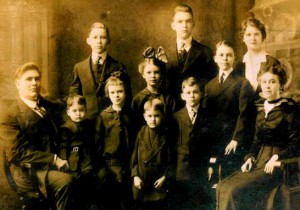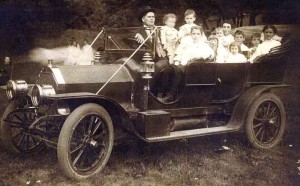Sunday morning. All Saints Day.
I had spent the night at a friend’s house; a group of us were there tucked into a honeycomb of bedrooms. In the wake of the previous evening’s Halloween shenanigans, we all awoke slowly and shambled toward the kitchen to begin the sacred ritual of coffee making.
We clutched our mugs and stood around the kitchen counter. In the unhurried and enfolding presence that Sunday mornings offer, we chose to acknowledge the day by telling stories of our grandmothers. Microbursts of memory, a tumble of adjectives and then wistfulness so palpable it thickened the air. All saints? Not really. But all, we decided, doing the best they could for the times they lived in and the women that they were.
My stories were of Rita, my mother’s mother, born in 1907 and widowed 50 years later. She never remarried. My mother is her second of six; I was Rita’s first grandchild. She was a reader and a painter with the auburn hair of her father, William Koehler, a name that means charcoal burner and arcs back to Switzerland in the 1500s. I loved her fiercely and look for traces of her in the woman I have become. I look for the line.
Monday morning. All Souls’ Day.
I wake at 6 a.m. as the morning light lavenders the sky. I remember sitting a year ago in the university canteen halfway around the world with my friend Nargiza. She and I taught journalism at the American University of Central Asia in Bishkek, Kyrgyzstan. Our time together was marked by conversation spurred by candid curiosity. We were other for each other, specimens of disparate cultures. Each time we met, we played our own improvisational version of 20 Questions.
Who do you come from? Nargiza asked offhandedly. We settled our lunch trays onto the tabletop. I launched into a story about my grandparents. Before them, she said. And then before them and before them. I curled inward with nothing to say. Here in Kyrgyzstan, Nargiza said, it is part of who we are to name and know seven generations before us. It’s our line, she told me.
Nargiza told stories of her clan and the centuries of descendants that had narrowed over time to produce the man and the woman who made her. My listening was clogged by a vivid image of an astronaut in one of those puffy white suits whose lifeline to the spaceship has been cut. Blank anguish on the face, the wide lens of empty space advancing. I felt anxious and unmoored, perilously adrift.
 Seven generations before me? My front-of-mind ancestral storytelling reaches back for two generations, tops. It’s been my choice, I suppose, though I’m not sure why I’ve made it. How is it that I don’t know my line?
Seven generations before me? My front-of-mind ancestral storytelling reaches back for two generations, tops. It’s been my choice, I suppose, though I’m not sure why I’ve made it. How is it that I don’t know my line?
It’s not for lack of material. I’ve the 16-page all caps family history my kooky Aunt Sis wrote decades ago, chronicling my mother’s side of the family. “Our forebears were a mixed and varied lot, ranging from doctors, lawyers and gentlemen farmers to immigrants and illiterates,” she writes in her opening. Sis collected clocks, had an ever present swarm of Scottish terriers around her ankles, and pointed her finger when she talked.
I have my cousin Kevin Walsh, a genealogist, writer and teacher, who created and maintains the KellyFamilyNetwork.com website, which parses the vast spread of Kellys I’ve descended from. I’ve fluttered about into my aunt’s stern interpretation of my maternal family tree and pecked into my cousin’s website from time to time. But neither has ever held much sway for me.
Until now. Now I’ve begun to consider the saints and the souls making the trees that bore the fruit of me. Perhaps I’ve been blasé about my heritage because of my inherent Americanness. I am a disciple of invention and mobility, a person more familiar with the larger world pond than her own gene pool. Maybe my lack of interest can be attributed to my identification as independent above all else. Maybe it’s my childlessness, my wanderlust, my zodiac sign. I’m not as interested in knowing the why not until now as I am freshly awakened by my desire to know more.
So I turn myself away from the seductive distractions of the present, the lull of the future. I begin to look more often over my shoulder at the past and its haze, its obscure and plentiful clues. I am compelled, eager to sift through it all. In honor of the ones who came before me, I am looking for the line. My line. It is, I believe now, a worthy and necessary quest.


